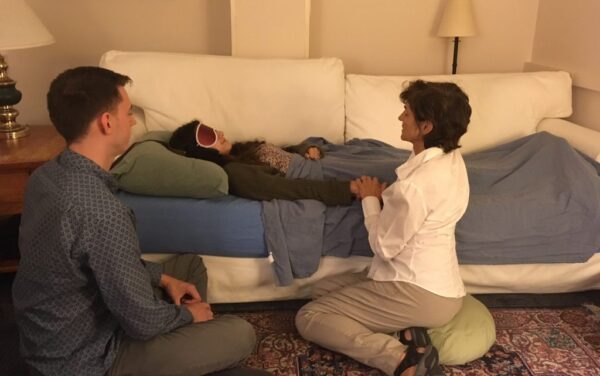
Written by Amelia French and Dr Alana Roy
Psychedelics and plant medicines have been used around the world since early humanity for spiritual, ritual, divination and recreational purposes.[1] Indigenous cultures used plants as medicines for millennia and many cultures carry on this tradition today.[2] Despite the growing evidence for use of psychedelics by humans as modern-day medicine for mental health disorders, they were abruptly made illegal to supply and possess by the United Nations convention in 1971 as a result of President Nixon’s War on Drugs.[3] Studies suggest psychedelics could be a breakthrough therapy for mental health issues including depression, anxiety, addiction, Obsessive Compulsive Disorder, and Post Traumatic Stress Disorder through their ability to work on a deep emotional as well as biological level. [4] Currently statistics of Mental Health in Australia is one in four people.[5] Depression is a leading cause of disability worldwide and is a major contributor to the overall global burden of disease.[6] There needs to be innovation and change for the treatment of mental illnesses. MMA are advocating for the therapeutic use of Psilocybin and MDMA to support people with treatment resistant depression and Post traumatic stress disorder, respectively.
Current pharmacotherapy treatments for depression and anxiety work in 20–40% of cases.[7] Psilocybin has been shown to alleviate depression in 67% of patients within one to two doses even where standard treatments have failed.[8] Current pharmacotherapy has even lower efficacy in the treatment of PTSD with success rates of around 20%, MDMA has been shown lead to remission from PTSD in 78% of cases where standard treatments have not worked.[9] Current treatments such as antidepressants must be taken every day for months, often years. With medicine-assisted psychotherapy, patients frequently experience long-lived reductions in symptoms within a few single dose sessions.
Around the globe we are seeing countries take the lead in medically assisted psychotherapy with the legalization or decriminalization of psychedelics with logical, research-based, and tolerant policies on psychoactive substances. There are currently no countries in which psychedelics are regulated and approved medicines. Also, psilocybin is legally available in the Netherlands and both psilocybin and MDMA are decriminalized for personal use in Portugal, Czech Republic and several countries in South America.[10] When we explore the research into countries with decriminalization of MDMA and Psilocybin from across Europe there is statistics to show the positive outcomes for mental health.
“When delivered safely and professionally, psychedelic therapy holds a great deal of promise for treating some very serious mental health conditions.” Dr Robin Carhart-Harris Head of the Centre for Psychedelic Research
Portugal allows the use of psychedelic drugs through the decriminalization of drugs since 2001 and opted for a harm minimization approach to drug use.[11] Portugal have found that removing criminal penalties for personal drug possession did not cause an increase in levels of drug use but rather drug use is dependent on social and cultural factors and trends.[12] Decriminalization allowed space for research into mental health, supporting those with addictions better access to services by reducing the taboo and shame around drug use.[13] The Dutch drug policy is also driven by the idea that each person should make informed decisions on matters of their own health and recognize that drug policy is also a social issue.
The Dutch are world-renowned for their more logical, research-based, and tolerant policies on psychoactive substances. However, this does not mean psychedelics are completely legal in the Netherlands. Just like many other countries, the Dutch government classifies some drugs, including certain psychedelics, as illegal substances however the use of psychedelics is regulated. Drug policy in the Netherlands is guided by the principle that suppressing drug use and having a blanket ban on all drugs does not make mental health illnesses associated with drug use disappear but quite the opposite, makes mental health outcomes worse.[14] This is reflected in literature that mental health issues become far more difficult to minimize and control without appropriate education and prevention of drug abuse disorders is one of the most effective ways to reduce the impact of mental health on individuals and wider society, this is done through education, effective treatments and reducing cultural stigma or shame around mental health. Mental health disorders are exacerbated through lack of recognition to research and suppression through drug policy.[15] Psychedelic assisted therapies can positively impact mental health outcome and has shown to be safe in therapeutic contexts.[16] The Netherlands are embracing medically assisted psychotherapies through clinics, which are leading a movement to transform the way people approach emotional, cognitive, and spiritual well-being, through safe and legal medically assisted psychotherapy backed by research.[17]
Switzerland have allowed the legal therapeutic use of LSD and MDMA for treatment of post-traumatic stress disorder and depression when used alongside non-drug psychotherapy sessions with an experienced practitioner.[18] In Switzerland, limited medical use of non-registered drugs, or compassionate use is available from psychiatrists to prescribe MDMA for therapeutic use in conjunction with talk therapy for the treatment of trauma disorders.[19] Subjects with chronic, treatment-resistant posttraumatic stress disorder experienced clinically meaningful improvements and no evidence of harm after participating in a Swiss study evaluating MDMA-assisted psychotherapy.[20] The field of medicine-assisted psychotherapy needs to be driven by evidence-based studies to inform policies and law. Through evidence-based research we can effectively improve the quality of people’s lives and to promote healthier societies through policy reform of medicine-assisted psychotherapy. Mind Medicine Australia are advocating for clinical changes to bring these new innovative mental health treatments to Australia. Law is socially constructed by the culture and social influence, and it is ever changing with new research and knowledge emerging. Psychedelics have been shown to have significant therapeutic potential which is seen to outweigh ill-informed anti-drug laws.[21]
There is significant evidence to support the safe use of medicine-assisted psychotherapy when used in a clinically controlled space and appropriate screening is conducted.[22] Research suggests that there is no link between the use of psychedelics and the development of mental illnesses.[23] Further to this, there has been no negative health outcomes associated with the use of psychedelic medicines.[24] However, psychedelic use is highly context dependent and we only advocate for clinical use of psychedelics.
Mind Medicine Australia is an Australian registered charity (with DGR-1 status) seeking to broaden the treatment paradigm available to medical practitioners and their patients and improve treatment effectiveness by establishing, safe, accessible and effective Medicine-Assisted Psychotherapy in Australia for major Mental Illnesses.
References
[1]. Nicola Bragazzi et al., ‘Ancient Shamanism and Modern Psychotherapy: From Anthropology to Evidence-Based Psychedelic Medicine,’ Cosmos and History: The Journal of Natural and Social Philosophy 4, no. 1 (2018): 142, https://cosmosandhistory.org/index.php/journal/article/view/688; David Smith, ‘The Role of the Journal of Psychedelic Drugs in the Evolution of Psychedelic Medicine,’ Journal of psychoactive drugs 51, no. 2 (December 2019): 98–101, https://doi.org/10.1080/02791072.2019.1589607
[2]. Richard Doblin, Merete Christiansen, Lisa Jerome, and Brad Burge, ‘The Past and Future of Psychedelic Science: An Introduction to This Issue,’ Journal of psychoactive drugs 51, no. 2 (April 2019):93–97, https://doi.org/10.1080/02791072.2019.1606472; Smith, ‘The Role of the Journal of Psychedelic Drugs,’ 98–101; Michael Winkelman, ‘Shamanic guidelines for psychedelic medicine,’ in Psychedelic medicine: New evidence for hallucinogenic substances as treatments, ed. Thomas Roberts (Connecticut: Praeger Publishers, 2007), 143–168, https://www.academia.edu/4165474/Shamanic_Guidelines_for_Psychedelic_Medicines
[3]. Doblin, Christiansen, Jerome, and Burge, ‘The Past and Future of Psychedelic Science,’ 93–97; Smith, ‘The Role of the Journal of Psychedelic Drugs,’ 98–101
[4]. Tanya Calvey and Fleur Howells, ‘An introduction to psychedelic neuroscience,’ Progress in Brain Research 242, no. 1 (2018): 1–23, https://doi.org/10.1016/bs.pbr.2018.09.013
[5]. Australian Bureau of Statistics. National Survey of Mental Health and Wellbeing: Summary of Results. Canberra: ABS, 2008. https://www.abs.gov.au/statistics/health/mental-health/national-survey-mental-health-and-wellbeing-summary-results/latest-release
[6]. World Health Organization. Prevention of Mental Disorders Effective Interventions and Policy Options. France: WHO, 2004. https://www.who.int/mental_health/evidence/en/prevention_of_mental_disorders_sr.pdf?ua=
[7]. Courtney Hutchison and Sara Bressi, ‘Social Work and Psychedelic‑Assisted Therapies: Practice Considerations for Breakthrough Treatments,’ Clinical Social Work Journal (January 2020), https://doi.org/10.1007/s10615-019-00743-x
[8]. Mind Medicine Australia. A new paradigm for mental health. Australia: MMA, 2020. https://mindmedicineaustralia.org/wp-content/uploads/2020/10/Mind-Medicine-Australia-EBook-09102020-small.pdf
[9]. Smith, “The Role of the Journal of Psychedelic Drugs,” 98–101
[10]. Jeff Lebowe, ‘A Global Guide to Where Magic Mushrooms and Psilocybin Are Legal or Decriminalized,’ Mary Jane, May 29, 2020, https://merryjane.com/culture/a-global-guide-to-where-magic-mushrooms-and-psilocybin-are-legal-or-decriminalized
[11]. David Bronner, ‘The Unified Field Theory of Psychedelic Integration and Portugal Style Decriminalization,’ Multidisciplinary Association for Psychedelic Studies 30, no. 1 (2020): 14–19, https://maps.org/news/bulletin/articles/439-bulletin-spring-2020/8126-the-unified-field-theory-of-psyhedelic-integration-and-portugal-style-decriminalization
[12]. Linnae Ponté, ‘Decriminalization and Harm Reduction in Portugal: An Interview with Dr. João Goulão,’ Multidisciplinary Association for Psychedelic Studies 25, no. 1 (2015): 18–21, https://maps.org/news/bulletin/articles/387-bulletin-spring-2015/5671-decriminalization-and-harm-reduction-in-portugal-an-interview-with-dr-jo%C3%A3o-goul%C3%A3o
[13]. Scott Bernstein, Emily Amirkhani, Dan Werb, and Donald MacPherson, ‘The regulation project: Tools for engaging the public in the legal regulation of drugs,’ International Journal of Drug Policy 86, no. 1 (December 2020):102949, https://doi.org/10.1016/j.drugpo.2020.102949
[14]. Bronner, ‘Unified Field Theory’
[15]. Bernstein, Amirkhani, Werb, and MacPherson, ‘The regulation project,’ 102949; WHO, Prevention of Mental Disorders
[16]. Calvey, and Howells, ‘Intro to psychedelic neuroscience,’ 1–23.
[17]. Bernstein, Amirkhani, Werb, and MacPherson, ‘The regulation project,’ 102949
[18]. Peter Gasser, ‘Psychedelic Group Therapy in Switzerland,’ Multidisciplinary Association for Psychedelic Studies 27, no. 1 (2017): 28–29, https://maps.org/news/bulletin/articles/420-bulletin-spring-2017/6622-research-update-psychedelic-group-therapy-in-switzerland
[19]. WHO, Prevention of Mental Disorders
[20]. WHO, Prevention of Mental Disorders
[21]. David Nichols, ‘Psychedelics,’ Pharmacological Reviews 68, no. 2 (April 2006):264–355, https://doi.org/10.1124/pr.115.011478; Tingying Chi and Jessica Gold, A review of emerging therapeutic potential of psychedelic drugs in the treatment of psychiatric illnesses,’ Journal of the Neurological Sciences 411, no. 1 (Jan 2020): 116715, https://doi.org/10.1016/j.jns.2020.116715
[22]. Jacob Aday et al., ‘Long-term effects of psychedelic drugs: A systematic review,’ Neuroscience and Biobehavioral Reviews 113, no. 1 (June 2020): 179–189, https://doi.org/10.1016/j.neubiorev.2020.03.017
[23]. Teri Krebs and Pål-Ørjan Johansen, ‘Psychedelics and Mental Health: A Population Study,’ PLoS ONE 8, no. 8 (August 2013): 1–9, https://doi.org/10.1371/journal.pone.0063972
[24]. Krebs and Johansen, ‘Psychedelics and Mental Health,’ 1–9
Dr Alana Roy
Ph. D Psychology, B. A Social Work (MHSW)
Dr Alana Roy is a psychologist, social worker and therapist and has spent the last 13 years working in mental health, suicide prevention, trauma, sexual abuse, family violence and the disability sector. Alana has worked with borderline personality and dissociative identity disorder in various roles in the community such as: Rape Crisis Centres with victims of ritual abuse, childhood and adult sexual assault, supporting women in the sex industry, survivors of human trafficking and now as a psychedelic integration specialist.
Alana focuses on harm reduction, community and connection. She is dedicated to psychedelic-assisted psychotherapy and plant medicines. She has engaged with, and provides integration therapeutic support services for communities across Australia. Alana works at several universities as a Research Fellow and supervisor of students on placement. Alana passionately advocates for public policy, community education and legislative changes so that these treatments are regulated and supported by a strong, connected and skilled sector.
Learn more about Alana’s experiences in: Psychedelic Medicines: How My Journey Into The Jungle Changed My Life



